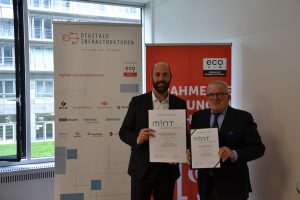- Digital infrastructure operators particularly affected by shortage of skilled specialists
- Alliance for the Strengthening of Digital Infrastructures in Germany supports the German initiative “MINT Zukunft schaffen” (“Establishing STEM’s Future”)
- Demand: German federal government must support nationwide campaign for the work sector of digital infrastructures
Many industries are looking for skilled specialists in Germany, but few sectors are so affected by the search for suitable personnel as the drivers of the digital transformation. Digital infrastructure providers such as data center operators, colocation operators, and cloud infrastructure providers are finding it increasingly difficult to find specialists in the fields of building technology, IT security, or systems engineering. The Alliance for the Strengthening of Digital Infrastructures in Germany, founded under the umbrella of eco – Association of the Internet Industry, now wants to proactively tackle this challenge and, as of today, is supporting the German initiative “MINT Zukunft schaffen” (“Establishing STEM’s Future”). This initiative promotes education in technical and scientific subjects and supports schools in their digital transformation.
“Current studies estimate that there are over 50,000 vacancies in this area in Germany. Of these, most are experienced by data centers and other operators of digital infrastructures in Germany,” says Béla Waldhauser, Spokesperson for the Alliance for the Strengthening of Digital Infrastructures in Germany. “In the medium term, this not only endangers the reliability of data centers, but also means that energy efficiency potentials are seldom sufficiently realized because there is a lack of skilled specialists with the necessary know-how.”
Waldhauser regards the status of digital education, which is particularly poorly positioned in Germany, as being a key problem. Another factor is the lack of visibility of his industry. “Everyone wants to work at Microsoft or Facebook, but hardly anybody is interested in data centers. This is because the importance of digital infrastructures is still discounted by society and politics,” says Waldhauser. He therefore also calls on the German federal government to provide greater support to operators of digital infrastructures in Germany, for example as part of a nationwide information campaign. Waldhauser warns that Germany as a digital location will not be competitive in the long term without skilled specialists.
The initiative “MINT Zukunft schaffen” has been supporting German schools on their way to a STEM profile for more than 10 years. Its aim is to make pupils in Germany fit for a technology-based future. “In order to attract suitable young talent, not just now but also in the future, digital education must be taught to pupils as early as possible. This will allow young people to later on make the right career choices for a digital future.”
“Data centers are the best example of a German future-oriented industry whose worth as an employer is extremely underestimated – which is incidentally also the case with many other STEM sectors” says Thomas Sattelberger, Chair of the Board of the “MINT Zukunft schaffen” initiative. “I am very pleased about the membership of the Alliance for the Strengthening of Digital Infrastructures. Together, we want to contribute to making digitalization and STEM professions tangible and attractive for schoolchildren,” continues Sattelberger.




